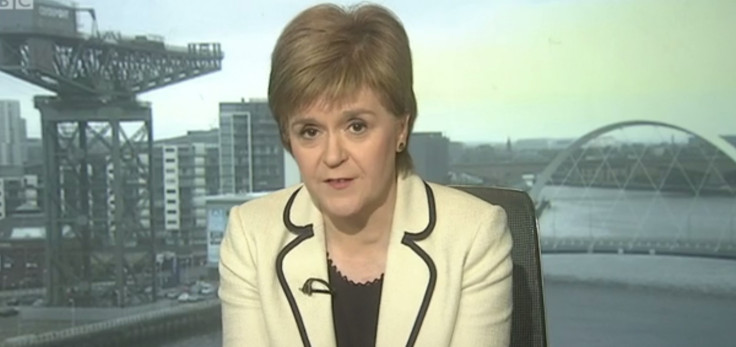Ms Sturgeon should forget Brexit and tackle the economy
Ms Sturgeon should give Brexit a rest, resist populist legislation and help Scotland's flattened economy

Before reading news of The Scotman's latest poll from YouGov, I couldn't resist taking part in the news site's "How would you vote in the event of a second referendum on Scottish independence?" caption.
Pressing "No Thanks", the screen brought up the instant result to date of the 49,306 responses. Contrary to the outcome reported so far in the article, only 33 per cent agreed with me against 63 per cent voting "Yes" for independence and four per cent "don't know". This only goes to show that referendums are not in tune with my thinking, for in the European Union one, I had thought Remain would win 52-48 right up until the loss in Sunderland was by such a big margin.
YouGov's poll had been conducted on behalf of the pro-union, Scotland in Union organisation and the most striking reply showed that 32 per cent wanted to wait until there was a clear deal with the European Union (EU) before deciding whether or not there should be a second independence referendum.
Interestingly, 25 per cent do not want a referendum before 2030, much more like the "Once in a generation" original policy stance of the Scottish National Party (SNP). Seventeen per cent never want another one – maybe like me they think referendums are not suited to our system of government – whilst (only) 16 per cent wanted a vote "as soon as possible."
Asked to rank what should be Holyrood's priorities, the NHS came out on top, followed by the economy and working with the UK Government to secure the best EU deal.
The Scotsman article went on to quote Alastair Cameron of Scotland in Union:
"We know the EU Referendum result has left many Scots disappointed and some people are calling for the debate on Scottish independence to be re-opened," whilst wanting to know what Brexit really means, "We believe people deserve to know what this...will mean for trade, for currency and for our borders.
"Importantly...we need to hear from those proposing Scottish independence, how we would deal with Scotland's £15 billion deficit."
Another person cited was Scottish Conservative constitution spokesman Adam Tomkins:
"This is more evidence that the SNP's headfirst lunge towards a second referendum following Brexit is not what the people want.
"Nicola Sturgeon should be working with the rest of the UK to get the best deal for Scotland."
Although Mr Tomkins is right enough about what her real priorities should be, accusing her of a "headfirst lunge" for a second independence referendum during the EU campaign is off the mark as all of Scotland's main parties had campaigned, often sharing platforms together, for the UK to remain in the EU.
All the main parties, including the SNP, had members who supported Brexit but did not resort to the lies and virulent anti-immigrant campaign waged South of the Border.
Ms Sturgeon, and for that matter the 48 per cent of the UK who voted to remain in the EU, awkwardly found that her Westminster MPs had become, at least in Brexit terms, the main opposition after former Prime Minister David Cameron resigned and declared that the "democratic will" of the people would be followed.
Added to this, the Parliamentary Labour Party, which supported Remain by some 75 per cent, went into meltdown over its leader Jeremy Corbyn who had immediately seconded the former PM's stance. As Labour couldn't or wouldn't put up any fight for Remain, Ms Sturgeon found herself the last Remainer standing!
Although Leave winning secured for the SNP an almost immediate rise in popularity in Scotland, polls indicating between 52 per cent and 59 per cent approval for independence, the real long-term gain is much harder to measure as much of the support is because many reckon the SNP will fight Scotland's corner best, and not for independence itself.
Ms Sturgeon is well aware of this and has always told her core support to wait until the polls are consistently around the 60 per cent mark before any further referendum should be held. Not an easy position to maintain.
Since Brexit however, the First Minister has allowed herself to be cornered into an anti-Brexit crusade she cannot win, allowing her opponents to use the possible second independence referendum as a stick to beat her with. Until Article 50 is triggered and there is some indication on Britain's future relationship with the EU, Ms Sturgeon should keep her powder dry.
After returning from holiday, it might be best for Ms Sturgeon to give Brexit a rest, resist populist legislation which invariably adds to government spending and concentrate on helping Scotland's flattened economy, due mostly to the continuing slump in the oil and gas sector, and which might go into recession in the next couple of quarters. Not to mention that near 10 per cent of Scottish GDP deficit.
That will mean hard choices and possibly passing unpopular legislation like raising direct and indirect taxes, cutting services or charging (more) for them, and even on occasion, making mistakes; pretty much par for the course for governments all over.
Until the SNP can cope with this sort of scenario and handle crises, it and Scotland, cannot properly seek independence.
© Copyright IBTimes 2025. All rights reserved.






















